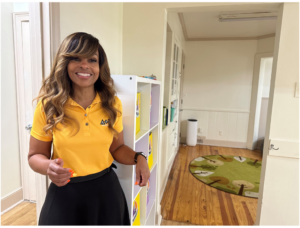An Atlanta child care provider discusses families’ challenging quest for high-quality, affordable care
 In her many years since founding the bright and homey APEC Learning Center on Cascade Avenue, Angelique Dutch has seen it happen time and time again—families are forced to pull their kids out of child care, quit their jobs, and keep everyone home. Why? Because they did everything right.
In her many years since founding the bright and homey APEC Learning Center on Cascade Avenue, Angelique Dutch has seen it happen time and time again—families are forced to pull their kids out of child care, quit their jobs, and keep everyone home. Why? Because they did everything right.
“It’s so hard to qualify for CAPS,” she explains of the Childcare and Parent Services subsidies that enable parents to enroll their children in programs like APEC. But the lucky few Georgians who score CAPS scholarships (only about five percent of income-eligible families per federal guidelines) often experience a perverse side effect from this success.
First, and happily, they see their incomes rise. Reliable, stable, high-quality child care, after all, means parents can thrive in their workplaces, complete their degrees, and/or simply maintain employment because they don’t have to miss work due to child care lapses.
But then, Dutch says, “The cycle just starts over. You realize, ‘I’m losing all my [CAPS] benefits because I’m working hard. Or maybe I’ve had some training and I’m able to earn more money. But the money I’m earning doesn’t offset the benefits that I lost.’ So, then you stop working. You have to stop working.”
While a household might be able to bounce back from such a blow, Dutch says that their child’s lost time cannot be made up.
“I mean, there’s a reset every Monday, just from kids going home on Saturday and Sunday,” she says with a laugh during a tour of the center’s sweet and roomy classrooms. “So, if you a miss a week or two, or two months or six months out of your preschool development? That’s a long time in the life of a two-, three-, or four-year-old. The preschool environment is critical, and they’re not going to be ready for public school if you don’t give them that early foundation.”
When it comes to Dutch’s business, where meeting quality standards requires a raft of expenses, CAPS funding can also be a mixed bag.
“I want to start from a place of gratitude,” she says of the subsidies. “Because the government doesn’t have to do anything. So, all the support is appreciated. But literally what CAPS pays for will not even pay the teacher. It hasn’t bought me food, it hasn’t paid the light bill, it hasn’t bought a new crib.”
Right now, Dutch relies on her own creativity and resourcefulness to keep her doors open. She feeds her students their many required meals with help from the federally funded Child and Adult Care Food Program. She’s added a gorgeous playground and a new classroom bathroom with grants from the GEEARS-led PAACT: Promise All Atlanta Children Thrive. She even cultivates a lush vegetable garden where her students can learn about green, growing things and families can take home produce each week.
But a beautifully spare classroom designed for students with post-pandemic behavioral challenges that make it difficult for them to thrive in a typical class currently sits empty. Dutch says she can’t cover the salary of the specialized teacher such students need. (And those students’ numbers are only growing.)
If CAPS provider reimbursements rates were raised, Dutch says, it would make a tremendous difference.
“My rate for infant care is $325 [per week],” she says matter-of-factly. “CAPS is only paying me $169. Even at $325, I’m only paying my teachers’ salaries. I’m eating the other costs in hopes that they have a sibling or I’m going to develop a long relationship with this child and they’re going to eventually matriculate up through my preschool classes.”
Dutch would also like to see an increase in CAPS’ qualifying family income thresholds. And she’d love to see families get a grace period if they lose their benefits—much like COBRA health insurance. With such a policy, children wouldn’t be yanked out of their care situation while their parents seek new employment or deal with CAPS online forms, which can be prohibitively onerous, especially for households without computers.
Georgia plans to implement several changes to CAPS rates in the coming months, but it’s unclear what the overall effect will be on the reimbursement rate. Which means Dutch doesn’t know how, or if, they’ll help her program. So, what if the fixes she needs don’t happen? Dutch’s always placid expression goes a bit grim.
“Eventually, we will have to consider no longer accepting subsidized care,” she says. “We’d have to serve less children at a higher rate and have what I call a ‘boutique operation.’ Doesn’t that sound lovely? It sounds wonderful, except what about the 60% of children that I have enrolled now who’ll have no care or have low-quality care? I love the boutique operation but I just want all children to have access to it.”